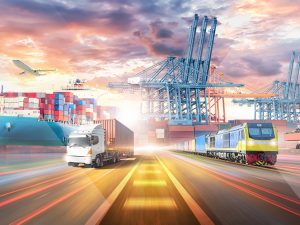A mega infrastructure project will be developed in Greater Noida with the launch of a land allotment scheme to establish a Multimodal Logistics Park (MMLP) in Sector Kappa 2, Dadri. This project will be developed on approximately 174 acres land which costs ₹11,000 per sq. mt. The site is located near the Noida International Airport in Jewar, said officials from The Greater Noida authority. “This is a unique project and a core component of Greater Noida authority’s Master Plan 2041 and it will address the National Capital Region’s expanding logistics needs and enhance competitiveness of industries in the global market. This project will not only fuel the growth but also create thousands of jobs,” said Ravi Kumar NG, chief executive officer of Greater Noida authority. It will also enjoy seamless connectivity to the Eastern and Western Dedicated Freight Corridors, positioning it as a key logistics and cargo hub in NCR.
Read More »KSH Distriparks to expand capacity with new yard in Talegaon
The year 2025 has seen growth to begin with. For 2024 -2025 financial year we ended with 100000 TEU’s and are expecting significant growth in 25-26. We are currently expanding capacity,” says Malcolm Dsouza, CEO, KSH Distriparks, adding, “Adding additional capacity with a new yard in Talegaon. Expected launch in Nov 2025. We are increasing our existing fleet size by an additional 20 per cent of our own and 40 per cent increase in the vendor’s fleet.”
Read More »IndiGo to start flights from Mumbai to Amsterdam & Manchester in July
IndiGo is all set to launch its maiden service from Mumbai to Amsterdam and Manchester from July 2025. The airline will operate a wet leased Boeing 787 on the routes which can carry up to 18-20 tonnes of cargo in each direction. “The opportunity for cargo for us is significant. It nicely coincides with the Make in India campaign which is becoming more and more prominent in terms of India becoming the global production hub,” Pieter Elbers, CEO, IndiGo said.
Read More »‘Alliances with other countries are crucial to boost supply chain resilience and efficiency’
Rajen Bhatia, MD, Tulsidas Khimji said, “The landscape of global trade is undergoing significant transformation, driven by strategic alliances, redefined trade routes, and technological advancements. These developments are enhancing connectivity and efficiency across supply chains. As India is now connected to the global world in good times, alliances with countries is important and even more when Geo-political and Geo-economical issues are going on the alliances with regards to supply chain as all of us are dependent on other countries for some materials whatever we manufacture. India’s integration into global supply chains has become increasingly vital amid ongoing geopolitical and geoeconomics shifts. As nations reassess dependencies and seek more resilient trade networks, India is emerging as a strategic partner in the evolving global landscape.”Collaborations among major shipping lines, such as the Ocean Alliance (CMA CGM, Evergreen, Cosco, and OOCL), enable carriers to share resources and coordinate services. Deploying larger vessels reduces per-unit shipping costs. Access to a broader range of services and destinations without individual investments in new routes. Improved Service Frequency: Increased sailing frequencies enhance reliability for businesses operating in just-in-time supply chains. • Risk Mitigation: Sharing risks associated with market volatility and large-scale investments contributes to industry stability. Digital Platforms: Regional Single Window (RSW) systems, like the ASEAN Single Window, facilitate interoperability among National Single Windows (NSWs), streamlining cross-border trade and reducing barriers within regions. Redefined Trade Routes India–Middle East–Europe Economic Corridor (IMEC): Launched in 2023, IMEC aims to bolster economic development by fostering connectivity between Asia, the Persian Gulf, and Europe. The corridor is a proposed route from India to Europe through the United Arab Emirates, Saudi Arabia, Israel, and Italy (or Greece). Belt and Road Initiative (BRI): …
Read More »‘Port of Antwerp – Bruges using 5G network & drones to improve efficiency’
Daljit Singh Kohli – India Representative – Port of Antwerp- Bruges said, “Technology is rapidly transforming port operations across the globe moving from traditional, manual processes to a more automated, data-driven, and connected environment. The Port of Antwerp-Bruges (PoAB) is leveraging technology to enhance efficiency in several ways, including through the development of a Digital Twin (integrating various port initiatives and providing real-time situational awareness), the use of drones and 5G networks, and the implementation of AI-powered solutions.”
Read More »‘Govt duly recognises India’s strategic position and potential’
Keku Bomi Gazder, CEO and MD, Aviapro Logistic said, “India plays a crucial role in the global air cargo ecosystem. The country’s geographical position offers a natural advantage, placing it at the center of the East and West, and allowing seamless connectivity to Asia, the European Union, North America, and the Middle East. Airports in Delhi, Mumbai, Bengaluru, and Hyderabad serve as key transshipment hubs, enabling smooth and efficient cargo flow. With the emergence of India as a key exporter in sectors like pharmaceuticals, electronics, textiles, and automotive, the country is steadily moving towards claiming its place as a global manufacturing hub – the demand for air freight comes in here. The government duly recognizes India’s strategic position and potential and is accordingly aligning initiatives to assist the expansion of India’s air cargo footprint into emerging markets such as Africa, Central Asia, and Latin America. Initiatives such as Gati Shakti and the Open Sky policy promote bilateral and free trade agreements to enhance India’s air freight links with partner countries. Also, dedicated cargo corridors are positioning India as a reliable cargo point.”
Read More »‘Trade alliance, collaborations crucial to deal with supply chain crisis’
Dr. Surendra K Ahirwar, ED, Traffic Commercial (Rates) and Business Development, Ministry of Railways said, “At present, in India, both geopolitical crises and geo-economic crises going on together. It is posing huge challenge to global supply chain. It is also increasing the intensity of complexity and uncertainty of global supply chains. Great alliances, ties, relationships with other countries is the solution for this. In such a situation we can rely on those we share great trade relations with to improve resilience. Importance of alliances is crucial during crises.”
Read More »‘Cost of doing business essential to improve ease of doing business’
Jivisha Joshi, Deputy Secretary, DPIIT, Ministry of Commerce and Industry said, “With the ease of doing business, it is very important to understand the cost of doing business. EoDB comes from the costs that it involves. For example, it has become important to understand and adopt sustainable business practices, green logistics, industry understands it, but there’s a cost involved. It should be feasible for all. So, if we talk about changing regulatory policies, we must understand the impact it will have on the businesses. Everything involves costs that should be considered too.”
Read More »‘ India has significantly enhanced efficiency and resilience in its cargo ecosystem’
CK Govil, President, ACAAI said, “India’s air cargo trade is witnessing remarkable growth, driven by rapid digitalisation, a strong focus on sustainability and increased collaboration across the supply chain. By embracing advanced technologies, streamlining operations and implementing green logistics practices, India has significantly enhanced efficiency and resilience in its cargo ecosystem. These progressive efforts have positioned India as a benchmark in the Asia-Pacific region, setting new standards for innovation and integrated growth in the air freight sector.”
Read More »‘APAC is manufacturing & e-commerce powerhouse’
Yukki Nugrahawan Hanafi, FIATA Region Asia-Pacific Chair said, “The Asia-Pacific region continues to serve as a manufacturing and e-commerce powerhouse, and this dynamic offers considerable growth opportunities. In the next 2–3 years, increased cross-border e-commerce, rising demand for high-value and time-sensitive goods, and the integration of digital platforms will be key drivers. Emerging economies in Southeast Asia are also investing in air cargo infrastructure, opening new trade lanes and regional gateways. In addition, the push for supply chain diversification is creating new logistics patterns and demand for reliable air cargo solutions.
Read More » Cargo Breaking News
Cargo Breaking News









